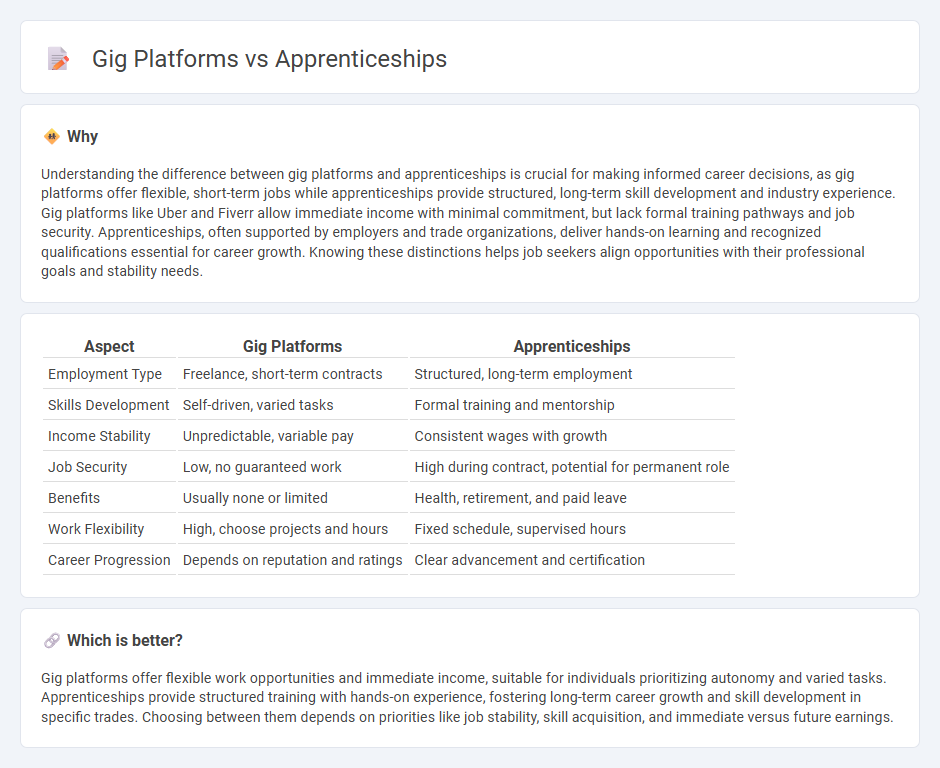
Gig platforms offer flexible, on-demand work connecting freelancers with clients worldwide, focusing on short-term projects and immediate payment. Apprenticeships provide structured training through hands-on experience combined with classroom instruction, fostering long-term skill development and career growth. Explore the differences between gig platforms and apprenticeships to determine the best path for your employment goals.
Why it is important
Understanding the difference between gig platforms and apprenticeships is crucial for making informed career decisions, as gig platforms offer flexible, short-term jobs while apprenticeships provide structured, long-term skill development and industry experience. Gig platforms like Uber and Fiverr allow immediate income with minimal commitment, but lack formal training pathways and job security. Apprenticeships, often supported by employers and trade organizations, deliver hands-on learning and recognized qualifications essential for career growth. Knowing these distinctions helps job seekers align opportunities with their professional goals and stability needs.
Comparison Table
| Aspect | Gig Platforms | Apprenticeships |
|---|---|---|
| Employment Type | Freelance, short-term contracts | Structured, long-term employment |
| Skills Development | Self-driven, varied tasks | Formal training and mentorship |
| Income Stability | Unpredictable, variable pay | Consistent wages with growth |
| Job Security | Low, no guaranteed work | High during contract, potential for permanent role |
| Benefits | Usually none or limited | Health, retirement, and paid leave |
| Work Flexibility | High, choose projects and hours | Fixed schedule, supervised hours |
| Career Progression | Depends on reputation and ratings | Clear advancement and certification |
Which is better?
Gig platforms offer flexible work opportunities and immediate income, suitable for individuals prioritizing autonomy and varied tasks. Apprenticeships provide structured training with hands-on experience, fostering long-term career growth and skill development in specific trades. Choosing between them depends on priorities like job stability, skill acquisition, and immediate versus future earnings.
Connection
Gig platforms and apprenticeships intersect by providing flexible, real-world work experiences that enhance skill development and employability. Gig platforms offer diverse, project-based opportunities while apprenticeships combine structured training with hands-on learning, creating pathways for career advancement. Both methods support workforce adaptability by fostering practical expertise and professional growth in dynamic economic sectors.
Key Terms
Training
Apprenticeships offer structured, hands-on training with experienced mentors, fostering skill development and industry-specific knowledge over extended periods. Gig platforms provide flexible, short-term work opportunities but often lack formal training or consistent skill advancement pathways. Explore how these models impact workforce readiness and career growth for deeper insights.
Flexibility
Apprenticeships offer structured learning with fixed schedules, providing stable skill development but limited daily flexibility. Gig platforms deliver unmatched flexibility, allowing individuals to choose projects and working hours freely while sacrificing consistent training and income. Explore how each option balances flexibility and career growth to determine the best fit for your goals.
Job security
Apprenticeships provide structured training and long-term job security through formal contracts, mentorship, and skill development within established companies, while gig platforms offer flexible but often unstable income without guarantees of continued work or benefits. The stability in apprenticeships supports career growth and financial predictability, contrasting with the fluctuating earnings and lack of social protections common in gig work. Explore the detailed comparison of job security factors between apprenticeships and gig platforms to understand which suits your career goals best.
Source and External Links
Career Seekers - Apprenticeship.gov - Apprenticeships provide paid on-the-job training combined with classroom education, delivering industry-recognized credentials and progressive wage increases to prepare individuals for careers in various fields.
Registered Apprenticeships | SC Works - Registered Apprenticeships are employer-driven programs that offer structured training blending supervised work experience with job-related classroom learning, yielding benefits like higher employee skills, improved productivity, and state tax credits.
Adult Apprentices - Trident Technical College - This program provides paid apprenticeships in trades such as construction and electrician roles, including national credentials and marketable skills, requiring applicants to be at least 18 and legally eligible to work in the U.S.
 dowidth.com
dowidth.com